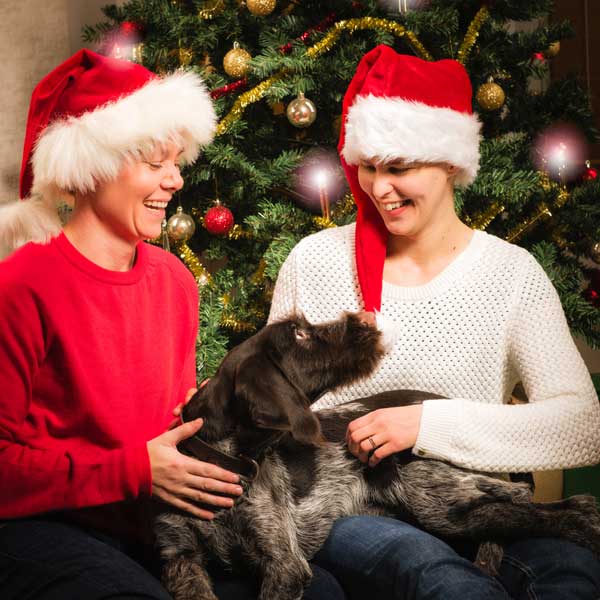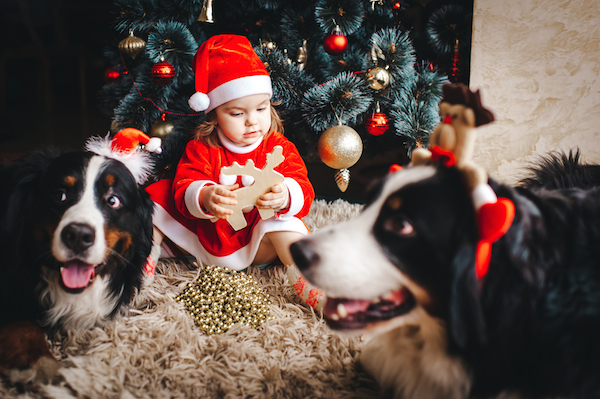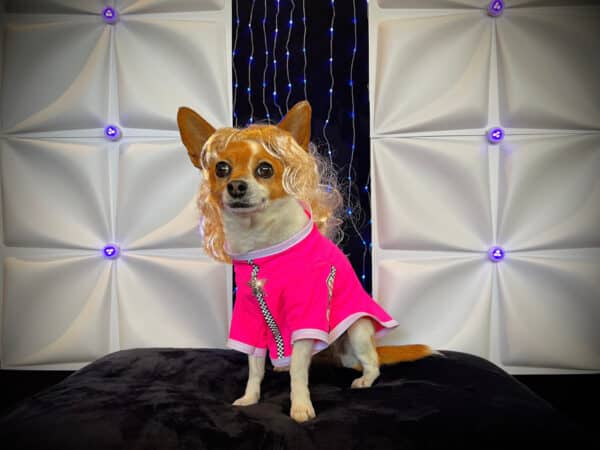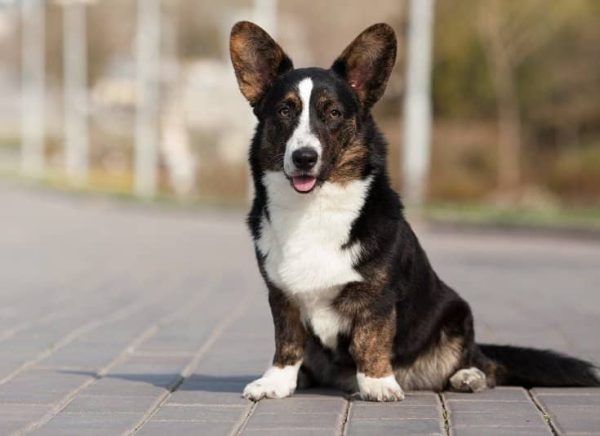The holiday season is upon us — and by “us,” I mean both our human and our canine families. Dogs are affected by changes in their environments, and from October through the new year, dogs will experience many changes in their homes with visitors, celebrations, and highly distracted humans. Prepare and protect your canine best friend from these environmental changes.
What dogs should be kept away from holiday gatherings altogether?

Let’s look at protecting dogs from what can be overwhelming human activity. This is the first line of offense for keeping your dog calm and content. The following kinds of dogs need to be kept away from large gatherings, preferably in another room or crate (if they are properly accustomed to and like being in a crate), far from the hubbub, with classical music used to block noise and with an excellent, long-lasting, safe chew toy:
- Shy dogs
- Noise-phobic dogs
- Aggressive dogs
- Reactive dogs
- Senior dogs or really young dogs (they can be part of the festivities but in smaller doses)
- Untrained dogs who jump on guests
What kind of dog can handle large crowds of festive humans? Some days I think the answer is none! Even if you do have a happy-go-lucky, loves-every-human dog, he too needs some quiet time during the holiday season.
If a dog does bite someone — especially a child — that’s often the death knell for the dog, even if he was put in a stressful situation and the adults didn’t properly supervise him with children. It’s better to be safe than the dog being sorry and losing his life for a situation that could have easily been avoided. Any dog with teeth can bite if he feels frustrated or threatened enough.
Training tips for dogs and holiday guests:
If you’re certain that your dog loves to be around loud humans in a celebratory mood, start acclimating him well before the family drives all that way to stay at your house with you and Rover. Here are some training tips to prepare your dog for holiday madness:
- Make sure you can safely pet your dog on all body parts. Start with slow, steady petting over his back; then give a treat. Move to the ears, and rub gently; then give a treat. Same with feet and tail, always following up the touching with something REALLY rewarding for the dog. I don’t think you should have to desensitize your dog to ear- and tail-pulling because, ideally, that should never happen to a dog. Most dogs, however, can be taught to enjoy or at least tolerate gentle human petting.
- Be sure your dog truly enjoys being petted by you or anyone else. If your dog tries to duck out of the way, flicks his tongue out, sinks to the floor, or tucks his tail while you are reaching for him, reevaluate his fondness for being petted. Something is aversive to the dog if that is how the dog interprets it.
- If you are sure your dog is comfortable around strangers, take him on several leashed walks on the outskirts of an event where there are many humans gathering, such as a street festival — but please, no fireworks or loud bands! Use truly motivating food treats and let your dog to sit to greet people, and monitor how they approach and pet your dog. Ask them to pet him under the chin or down his back instead of a pat, pat, pat on his head. Treat your dog for being a good boy after the human interaction. If your dog stops eating, leave the area and try from a farther distance. If you dog appears stressed, call it a day; then closely monitor him when you do have a full house.
- Don’t allow kids or adults to hug your dog. Humans love to hug; most dogs do not. Owners have a hard time believing this one, but, in general, most dogs can live a fine life without humans throwing their arms around their necks and squeezing them.
- Keep an eye on your dog if there is a lot of holiday food laying around within easy reach. I remember one Thanksgiving when a guest put a chocolate cake on a low table, and before I could even walk over to move it up higher, my German Shepherd beat me to it and gulped down half of it! He had never taken any food off of a table in his six years with us, but that day he chomped on that cake. Chocolate is poisonous to dogs, so we made a trip to the vet on Thanksgiving Day.
- Make sure your dog still gets his routine physical activity each day, even when you’ve fought off other shoppers for the “it” Christmas item that day at the mall and you are exhausted from all of the holiday parties. Dogs don’t celebrate holidays or mark them on a doggie calendar, so work to keep their routines as normal as you possibly can.
Dogs are a lot of responsibility. We need to remind ourselves to make sure our pets’ needs are met during a busy but fun time of the year for humans. Often, we humans even get worn down from the business of the season, and where do we often go to seek refuge? A quiet setting with man’s best friend. So, return the favor to your dog, and make sure he has a doggone good time, too.
About the author: Annie Phenix, CPDT-KA, is a force-free professional dog trainer enjoying her mountain-filled life in Colorado. She is a member of the Pet Professional Guild and the National Association of Canine Scent Work. She is also working on a book due out in spring of 2016: The Midnight Dog Walkers, about living with and training troubled dogs. Join Annie on her dog-training Facebook page.
Editor’s note: This article appeared in Dogster magazine. Have you seen the new Dogster print magazine in stores? Or in the waiting room of your vet’s office? Subscribe now to get Dogster magazine delivered straight to you!
Tell us: How you manage your dogs and holiday guests? What tips do you have?
This piece was originally published in 2017.
Thumbnail: Photography by LovelyColorPhoto / Shutterstock.
Read more about dogs and holidays on Dogster.com:





